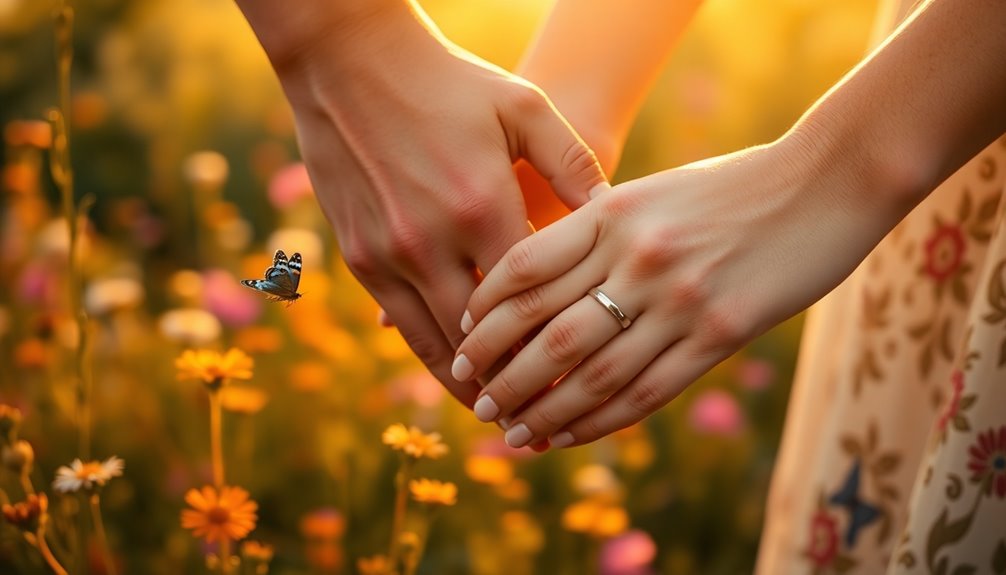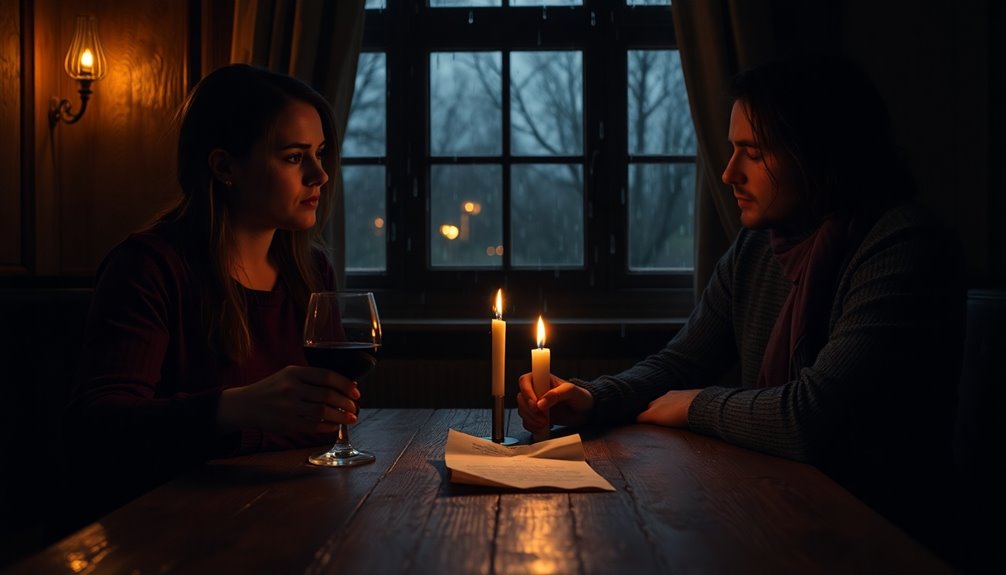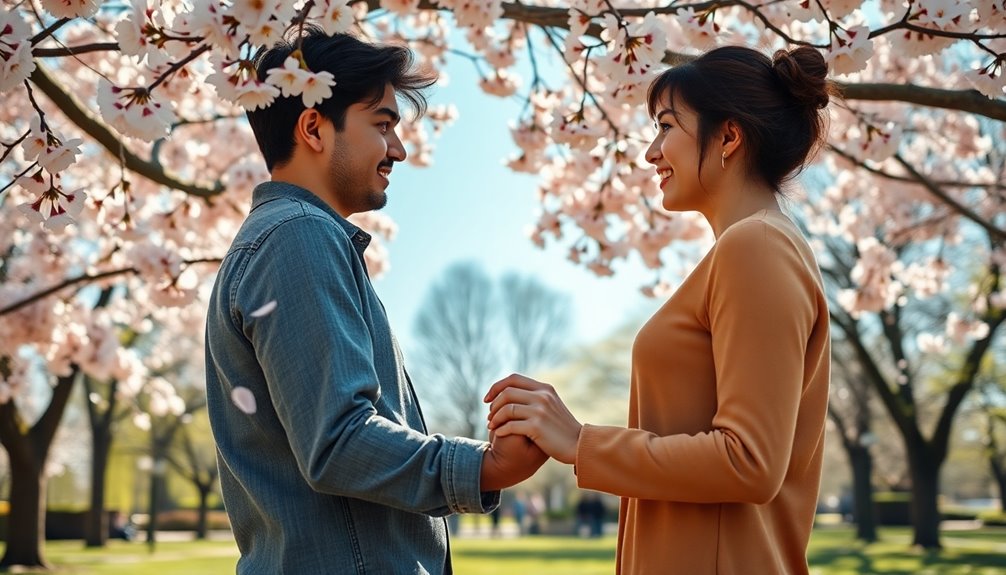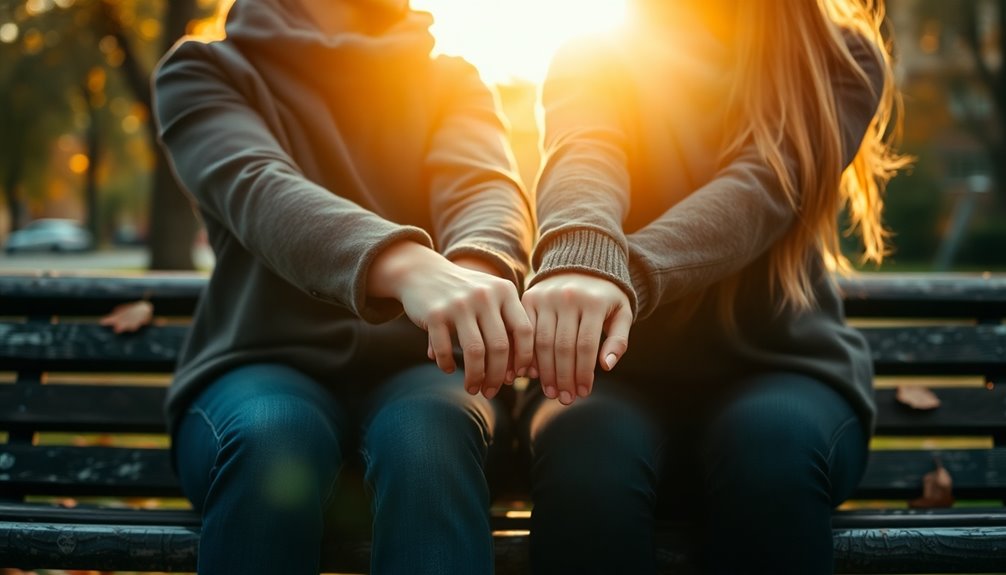Unrequited love is when you have deep feelings for someone who doesn't return them, often causing emotional pain. You might find yourself idealizing this person, ignoring their flaws, and feeling intense longing. Signs include constant thoughts about them and distress when you see them with others. This one-sided affection can impact your self-esteem and lead to feelings of loneliness. To heal, it helps to acknowledge your feelings, set boundaries, and focus on self-love. Engaging in new hobbies and seeking support can ease the pain. There's much more to uncover about coping strategies and emotional growth ahead.
Key Takeaways
- Unrequited love is one-sided affection, often leading to emotional distress and feelings of inadequacy when feelings are not reciprocated.
- Common signs include persistent thoughts about the person, idealization, and emotional turmoil, especially when witnessing their interactions with others.
- The emotional impact can lead to anxiety, depression, diminished self-esteem, and chronic sadness, affecting daily life and social interactions.
- Healing strategies involve acknowledging feelings, engaging in self-care, setting healthy boundaries, and seeking support from friends or professionals.
- Emphasizing self-love and exploring new hobbies can redirect focus, fostering personal growth and resilience in future relationships.
Definition of Unrequited Love
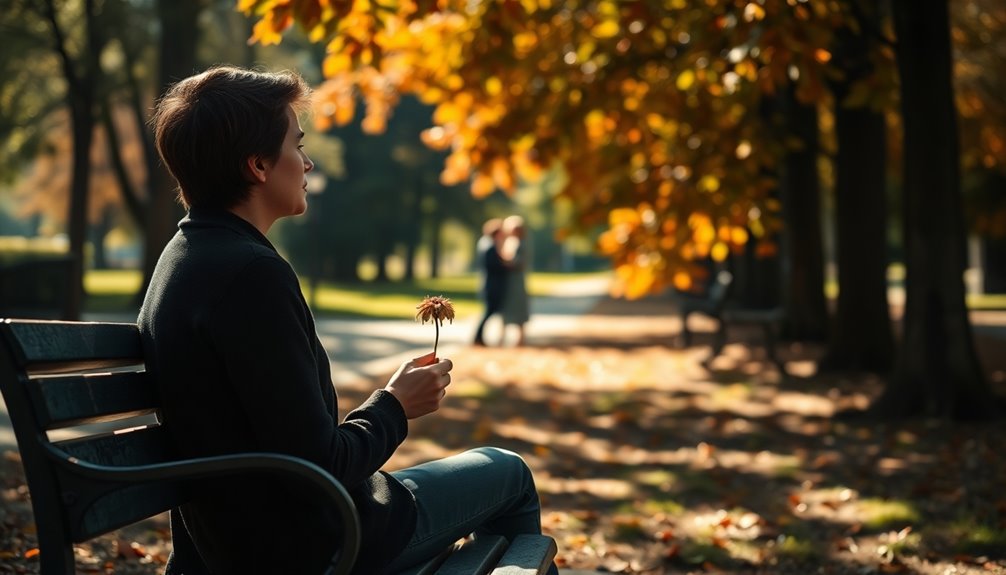
Unrequited love, which refers to one-sided affection, can be a deeply painful experience. When you develop romantic feelings that aren't returned, you may face emotional pain that feels all-consuming.
This situation often leads to feelings of rejection and loneliness, making it hard to cope. Signs of unrequited love include persistent longing for the other person and a tendency to idealize them, despite their lack of interest.
You might find yourself reaching out while they remain distant, leaving you in emotional turmoil. It's not just a fleeting phase; many people encounter unrequited love at some point, often resulting in increased anxiety and feelings of inadequacy.
Understanding this definition can help you navigate your emotions more effectively.
Signs of Unreciprocated Feelings

Recognizing the signs of unreciprocated feelings can help you make sense of your emotional state. Here are some key indicators:
| Signs | Description | Impact |
|---|---|---|
| One-sided communication | You're always the one reaching out. | Leads to frustration. |
| Idealization | You overlook their flaws and build unrealistic views. | Creates disappointment. |
| Mixed signals | There's occasional engagement but emotional distance. | Causes confusion. |
If you notice these signs, you might be experiencing unreciprocated love. A lack of mutual interest, slow responses, and emotional turmoil can disrupt your life. It's vital to address these feelings for your emotional well-being. Embracing unconditional love can also serve as a foundation for healing and self-acceptance during this challenging time.
Common Types of Unrequited Love

Unrequited love often surfaces when you're drawn to someone who's emotionally unavailable, leaving you longing for a connection that's never going to happen.
You might also find yourself hung up on a past relationship, struggling with feelings for an ex that won't fade.
Recognizing these common types can help you understand your emotions and start the healing process.
Unavailable Love Interests
When it comes to love, many find themselves drawn to those who are simply out of reach, often leading to heartache. Unavailable love interests typically include those already in committed relationships, making your romantic feelings unreciprocated.
Infatuations with friends can complicate matters; emotional closeness may lead you to misinterpret their feelings, even when they aren't interested romantically.
Casual dating can also result in unrequited love, where you develop deeper emotions while the other person remains indifferent.
The allure of the unattainable often enhances your feelings, causing idealization and significant emotional investment.
These unresolved feelings can cloud your ability to move forward, leaving you stuck in a cycle of longing for someone who simply isn't available.
Lingering Ex-Relationships
Even after a breakup, it's common to find yourself grappling with lingering feelings for an ex-partner. This type of unrequited love often stems from unresolved emotional attachments, leaving you longing for what once was.
You may desire to reconnect, only to face sadness and frustration when those feelings aren't reciprocated. These lingering feelings can cloud your judgment, making it tough to form new romantic relationships.
To navigate this emotional turmoil, engaging in self-reflection is essential. Acknowledge the reasons for the breakup and focus on healing.
Causes of Unrequited Love
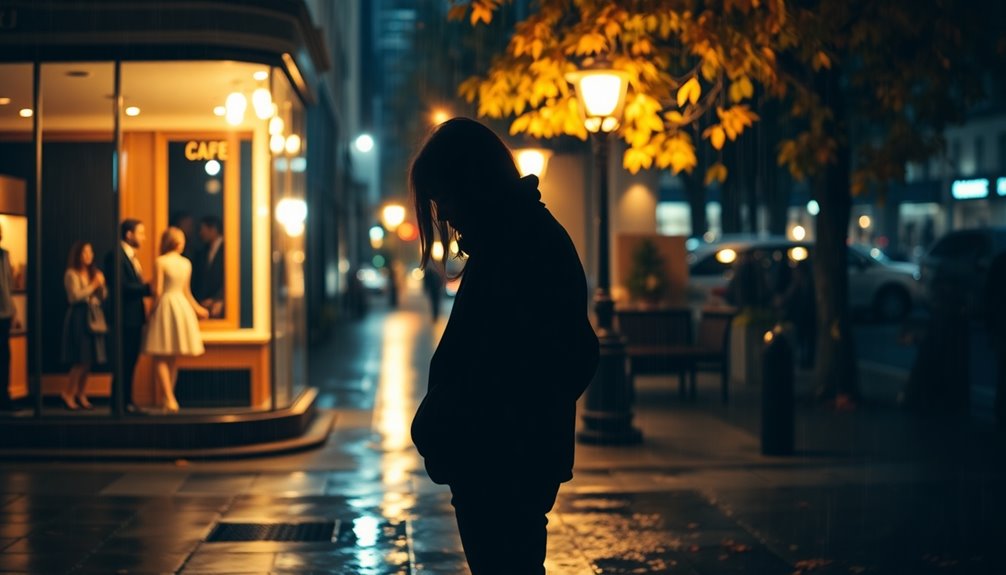
Unrequited love often stems from idealizing your love interest, where you focus on their perceived perfection while ignoring their flaws.
You might also find yourself drawn to those who seem unattainable, enhancing their allure and deepening your longing.
Additionally, your attachment style can play a role; if you struggle with insecurity, it may lead to emotional distance and unreciprocated feelings.
Idealization of Love Interest
Although the heart often seeks connection, the idealization of a love interest can cloud your judgment and lead to unreciprocated feelings. This tendency often stems from various factors that distort your perception and enhance emotional attachment:
- You might overlook their flaws, creating an unrealistic image.
- Insecure attachment styles can drive you to idealize as a coping mechanism.
- The allure of the unattainable makes them seem more desirable.
- Your brain's reward system activates when you fantasize about this idealized love.
Such idealization fosters persistent longing, making it tough to move on from unrequited love.
Recognizing these patterns is essential for healing and allowing yourself to find genuine connections that are mutual and fulfilling.
Attraction to Unattainable Partners
When you find yourself drawn to unattainable partners, it often reveals deeper emotional patterns at play. This attraction can stem from idealization, where you overlook flaws and project desires onto them. The challenge of their inaccessibility can heighten emotional investment, making you crave their affection even more. Aromatherapy can be a useful tool for managing the emotional distress that arises from these pursuits. Additionally, the effect of automation's role in business intelligence in analyzing emotional trends can provide insights into your behavioral patterns. Cultural narratives often romanticize these pursuits, influencing you to chase love that may harm your mental health. Recognizing signs of stagnation in relationships can be crucial for understanding your attraction to unattainable partners. Individuals with Borderline Personality Disorder may experience intense emotional responses, which can further complicate their pursuit of unattainable love.
Insecure Attachment Styles
Understanding your attachment style can shed light on why you might experience unreciprocated feelings in love. Insecure attachment styles, like anxious or avoidant, greatly influence how you perceive romantic feelings and relationships.
Anxiously attached individuals often idealize their love interests, leading to emotional turmoil when those feelings aren't mutual. On the other hand, avoidantly attached individuals may struggle with vulnerability, hindering reciprocal emotional connections.
Consider these factors:
- You may become overly preoccupied with reciprocation.
- Vulnerability can feel like a threat, preventing closeness.
- Heightened anxiety often leads to distress in romantic pursuits.
- Recognizing your relationship patterns can guide healing.
Emotional Impact on Individuals

Unrequited love can deeply affect your emotional well-being, leading to intense feelings of sadness and loneliness. The emotional distress you experience may feel overwhelming, often manifesting as increased anxiety that disrupts your daily life.
You might find yourself grappling with feelings of inadequacy and low self-esteem, which stem from internalized perceptions of worth due to the lack of reciprocation. Chronic attachment to someone who doesn't share your feelings can exacerbate these symptoms, potentially resulting in long-term mental health issues.
This turmoil may push you toward isolation, causing withdrawal from social interactions and neglecting your personal responsibilities. Recognizing these impacts is vital for your healing journey and emotional recovery.
Negative Effects on Mental Health

Unrequited love can hit your mental health hard, leaving you feeling anxious and emotionally drained.
As you grapple with feelings of sadness, your self-esteem may take a nosedive, making you question your worth.
This emotional turmoil often leads to isolation, which only deepens the loneliness you already feel.
Emotional Distress and Anxiety
When you're caught in the throes of unreciprocated feelings, the emotional distress can feel overwhelming. Unrequited love often leads to heightened anxiety and sadness, disrupting your daily life.
The impact of rejection can be profound, activating brain regions linked to physical pain.
You might experience:
- Increased feelings of loneliness
- Prolonged sadness that can lead to depression
- Disrupted sleep patterns and physical health issues
- A decline in self-esteem and feelings of inadequacy
These symptoms can create a vicious cycle, affecting your mental health.
To navigate this challenging time, consider seeking support, practicing self-care, and exploring healing tips that encourage emotional resilience.
Low Self-Esteem Impact
Experiencing unreciprocated love can deeply affect your self-esteem, making you feel unworthy of affection and connection. This low self-esteem often leads to emotional distress, exacerbating anxiety and depression. You might find yourself comparing your worth to others, which only diminishes your self-worth further. The physical manifestations of this turmoil can disrupt your well-being, leading to sleep disturbances and increased stress.
| Negative Effects | Impact on You |
|---|---|
| Low Self-Esteem | Feeling unworthy |
| Emotional Distress | Anxiety and depression |
| Poor Self-Image | Comparison to others |
| Physical Symptoms | Sleep disturbances |
| Hindered Growth | Trouble forming healthy relationships |
Addressing these issues is essential for personal growth and fostering healthier relationships in the future.
Isolation and Loneliness Effects
Feeling isolated often accompanies the pain of unreciprocated love, as you might withdraw from social interactions to shield yourself from emotional distress.
This isolation can worsen your loneliness, leading to negative mental health effects like anxiety and depression. You may find yourself stuck in a cycle that erodes your self-esteem and sense of worth.
- Heightened feelings of unworthiness
- Increased anxiety and depression
- Difficulty engaging in healthy relationships
- Ruminative thinking about emotional pain
These factors can prevent you from seeking support and connecting with others, intensifying your feelings of loneliness.
It's crucial to recognize this cycle and take steps toward healing to protect your mental health and rebuild your sense of connection.
Healing Strategies and Tips

Although unrequited love can feel isolating, there are effective healing strategies to help you navigate this emotional turmoil. Acknowledge your feelings to normalize them and engage in self-care activities to promote emotional resilience. Incorporating mindfulness practices can assist in processing emotions without overwhelm. Practicing stress management techniques can further support your journey toward healing. Consider seeking professional therapy for tailored coping strategies if sadness lingers, as professional therapy has been shown to enhance emotional well-being. Building a supportive social network is also essential; sharing your experiences with trusted friends can alleviate feelings of loneliness. Additionally, finding ways to maintain involvement in children's lives during emotional distress can provide a sense of purpose and connection.
| Healing Strategies | Tips |
|---|---|
| Self-Care | Pursue hobbies and interests |
| Emotional Resilience | Cultivate a positive mindset |
| Mindfulness | Practice acceptance techniques |
| Professional Therapy | Explore therapy options |
| Supportive Network | Connect with friends regularly |
Importance of Self-Care

Self-care plays an essential role in maneuvering the challenges of unrequited love. By prioritizing your well-being, you can combat emotional distress and foster emotional stability.
Here are some effective self-care strategies:
- Establish healthy boundaries with your love interest to minimize turmoil.
- Engage in activities that bring joy, like hobbies or exercise, to restore normalcy.
- Incorporate mindfulness practices and journaling to enhance emotional awareness. Regular self-reflection can lead to personal growth and improved relationships.
- Seek social support from friends or community activities to feel less isolated.
These practices not only promote emotional recovery but also strengthen your resilience. Additionally, setting realistic goals can help you focus on your personal growth and improve your overall well-being during this difficult time.
When to Seek Professional Help

When unrequited love begins to overshadow your daily life, it is crucial to recognize the signs that indicate it might be time to seek professional help. If you're experiencing significant distress, like persistent sadness or difficulty resuming daily activities, consider therapy. Friends and family may notice changes in your emotional well-being, signaling the need for support.
| Signs to Seek Help | Suggested Actions |
|---|---|
| Significant distress | Consult a therapist |
| Persistent ruminating thoughts | Explore coping strategies |
| Feelings of depression or suicidal thoughts | Seek immediate assistance |
Therapy can provide valuable coping strategies and emotional tools, helping you understand unhealthy relationship patterns that contribute to your turmoil. Additionally, engaging in online communities can offer support and foster resilience during this challenging time. Prioritize your mental health; reaching out is a brave step toward healing.
Moving Forward After Heartbreak
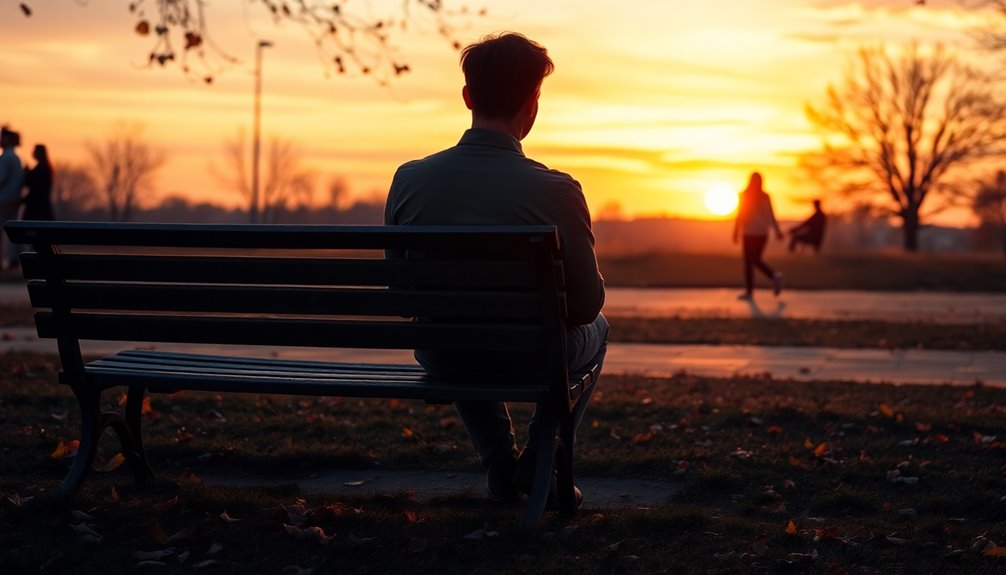
Moving forward after unrequited love can feel intimidating, but recognizing that this emotional pain is a temporary experience is essential for healing.
Embrace this time as an opportunity for personal growth. Here are some effective strategies to aid your healing process:
- Prioritize self-care by engaging in activities that bring you joy and rebuild self-esteem. Emotional regulation is key to managing the intensity of your feelings during this time. Remember that seeking support from friends and family can significantly enhance your emotional well-being.
- Set clear emotional boundaries and limit contact with your love interest to help process your feelings.
- Seek support from friends, family, or professionals who can offer valuable perspectives and coping strategies.
- Reflect on the experience to learn about your relationship patterns and emotional needs for healthier connections in the future.
- Remember that maintaining emotional alignment is crucial for moving forward and attracting healthier relationships.
Frequently Asked Questions
How to Deal With the Pain of Unrequited Love?
Dealing with the pain of unrequited love isn't easy, but it's important to acknowledge your feelings.
Allow yourself time to grieve what could've been. Engage in self-care to redirect your focus—try mindfulness, pick up a hobby, or spend time with friends.
It's vital to maintain distance from the person to ease your pain.
Don't hesitate to seek support if you're struggling, and reflect on the experience for personal growth.
Will the Pain of Unrequited Love Ever Go Away?
You might feel like the ache of unrequited love will never fade, but it will.
Just as the seasons change, your emotions will shift too. Over time, you'll find that acknowledging your feelings and allowing yourself to heal can lighten the burden.
Engaging in self-care and forming new connections will help you rediscover joy.
How to Heal When Someone Doesn't Love You?
When someone doesn't love you, healing starts with acknowledging your feelings.
Give yourself permission to grieve this loss; it's okay to feel hurt.
Immerse yourself in self-care by pursuing hobbies that excite you—this helps rebuild your self-esteem.
Surround yourself with supportive friends who can offer comfort and perspective.
Consider talking to a therapist for coping strategies.
Finally, practice mindfulness to connect with your emotions and gradually accept the situation.
You'll find peace in time.
What Are the 5 Stages of Unrequited Love?
Imagine standing outside a closed door, desperately hoping it'll open. That's how unrequited love feels.
You experience five stages: first, you're in denial, ignoring signs of disinterest.
Then, frustration hits, filled with longing.
You might try bargaining, thinking you can change their mind.
If that fails, depression sets in, clouding your thoughts.
Finally, you reach acceptance, acknowledging your feelings and beginning to heal, ready to embrace new possibilities ahead.
Conclusion
In exploring the painful reality of unrequited love, you've likely realized that it's a common yet deeply personal experience. The truth is, while unreciprocated feelings can feel isolating, they also present an opportunity for growth and self-discovery. By embracing self-care and understanding your emotions, you can heal and move forward. Remember, love—whether returned or not—teaches valuable lessons about your desires and resilience. You're not alone; many have walked this path and emerged stronger.

